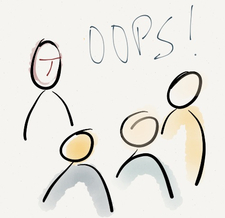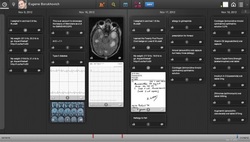By Billy BennettYesterday, I took time to do some mandatory holiday shopping with my family. The weather is warm here. World news has been anything but joyous. So, the holiday spirit is still something that had not yet arrived in full. And yet, fate had a different plan for my day. It was my job to find a table for us in the food court at the mall. The place was packed and I don't like feeling like I am back in junior high school looking for a place to sit among the crowd.
So, I looked for a place with some quality personal space.
I found it at a table with a group of youth who seemed to be having a little too much fun. It could be that's why they had space around them. We are taught to be suspicious of excessive happiness. They were suspicious. However, after hearing lots of laughter and a few attempts by one or two of them to sing a few bars, my wife leaned toward them and said "Go ahead sing us a song". Wow. They huddled around the table, made a couple of quick decisions and let loose. I captured this video on the second song they sang... I was in shock during the first one. It is a mixture of Jingle Bells and Rudolph. Great harmony and pure joy. In a few minutes they shared that joy - no infected their joy into the lives of hundreds of people around them. It was amazing to watch the transformation of noise into jaw dropping attention.
It turns out they were students from our local university who had completed exams and were out relaxing and just having fun with each other. They are members of Creative Impressions a student performing choir.
My lessons
I think life is most fun when it gives me unexpected gifts. How about you? Here are my lessons from this little encounter.
Happy Holidays.
So, I looked for a place with some quality personal space.
I found it at a table with a group of youth who seemed to be having a little too much fun. It could be that's why they had space around them. We are taught to be suspicious of excessive happiness. They were suspicious. However, after hearing lots of laughter and a few attempts by one or two of them to sing a few bars, my wife leaned toward them and said "Go ahead sing us a song". Wow. They huddled around the table, made a couple of quick decisions and let loose. I captured this video on the second song they sang... I was in shock during the first one. It is a mixture of Jingle Bells and Rudolph. Great harmony and pure joy. In a few minutes they shared that joy - no infected their joy into the lives of hundreds of people around them. It was amazing to watch the transformation of noise into jaw dropping attention.
It turns out they were students from our local university who had completed exams and were out relaxing and just having fun with each other. They are members of Creative Impressions a student performing choir.
My lessons
I think life is most fun when it gives me unexpected gifts. How about you? Here are my lessons from this little encounter.
- Taking a risk to make a relationship - no matter how small - can result in great gifts. Had I not chosen to sit where no one else wanted to sit we never would have been entertained.
- There are people doing great things. In spite of the news there are youth who make me believe that there is hope for a future - and it is a good one.
- Life takes courage - but the biggest hurdle is the first step... after that everything gets easier. Had my wife not been willing to stick her head into a group of strangers and asked the question we never would have known. Had the group declined the request because they did not have the right acoustics or all of their members - we never would have heard.
Happy Holidays.




 RSS Feed
RSS Feed